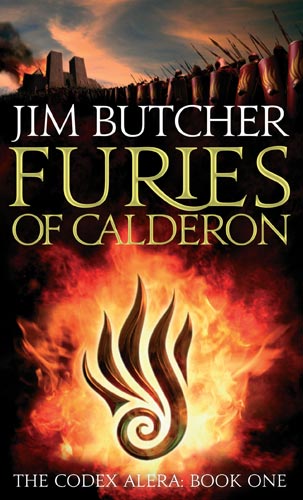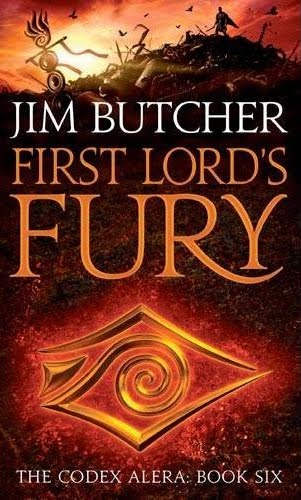Recommended Reading: Codex Alera
I have previously expressed my undying passion for the only wizard in the phonebook, Harry Dresden. I sometimes forget that Jim Butcher also has a high fantasy series, the Codex Alera, which is equally fantastic, and maybe a little easier to get into since it's only six books and not 15 and counting.

The premise of the books is that the lost Roman Legion was was pulled through a portal to another world, one populated with other human-like creatures with their own strengths and abilities. They develop the ability to harness the power of elemental spirits of the world, known as furies. Over the course of a thousand years, they create a strong nation, Alera, ruled by the First Lord. Their primary enemies are the Marat, a wild race whose psychic bonds to various animals divide them into tribes; the Canim, a race of wolf men; and the Icemen, yeti-like creatures of the Northern wastes.
As the story begins, Alera is at peace, but that peace is beginning to fracture. The First Lord, Gaius Sextus, is in his waning years, and his son and heir, Gaius Septimus, was killed in a battle with the Marat 20 years earlier, leaving him without a successor. The other lords jockey for power, trying to set themselves up to take his place, even as external threats, new and old, threaten the realm.
This is very much a Joseph Campbell-esque hero's journey. The main protagonist, Tavi, grows up on a small farm, and is the only person in the land without the ability to use furies. While at times this puts him at a stark disadvantage at times, it also forces him to rely on his wits rather than his magic, and the fact that he thinks differently than those around him becomes a powerful advantage.
Tavi is, of course, not just a simple farm boy, and I don't think I'm spoiling anything by revealing that. What's interesting is not the fact that he's Gaius Octavian, son of the slain Princeps and heir to the First Lord, but how he becomes that man; how he grows and changes, discovers his power, and overcomes the obstacles in his path.

I was an avid reader of the Game of Thrones books, and I still really like them. They were pretty revolutionary when they came out. While there had certainly been other dark, gritty fantasy series before it, GoT made that style of fantasy popular, displacing the high fantasy of the 80s which, while fun, had gotten kind of predictable (farm boys wandering through forests with a band of archetypes looking for magic swords, and no one you like ever dies). However, GoT has gotten almost unrelentingly dark, to the point where I will be presently surprised if the White Walkers don't win the whole thing.
Codex Alera does a good job of finding a middle ground between the two styles. The structure is in keeping with that older style of fantasy, but the execution is more like the gritty, political, dark fantasy that's become more popular. The stakes are high, and there is genuine tension in the threats that the characters face, in large part because they are universally well developed and not flat or one dimensional. There's still a sense of humor and lightness to the whole thing, even when the odds seem insurmountable. That's part of what I love about fantasy - the hopefulness, the feeling that the characters that I love can overcome the odds that are stacked against them.

The premise of the books is that the lost Roman Legion was was pulled through a portal to another world, one populated with other human-like creatures with their own strengths and abilities. They develop the ability to harness the power of elemental spirits of the world, known as furies. Over the course of a thousand years, they create a strong nation, Alera, ruled by the First Lord. Their primary enemies are the Marat, a wild race whose psychic bonds to various animals divide them into tribes; the Canim, a race of wolf men; and the Icemen, yeti-like creatures of the Northern wastes.
As the story begins, Alera is at peace, but that peace is beginning to fracture. The First Lord, Gaius Sextus, is in his waning years, and his son and heir, Gaius Septimus, was killed in a battle with the Marat 20 years earlier, leaving him without a successor. The other lords jockey for power, trying to set themselves up to take his place, even as external threats, new and old, threaten the realm.
This is very much a Joseph Campbell-esque hero's journey. The main protagonist, Tavi, grows up on a small farm, and is the only person in the land without the ability to use furies. While at times this puts him at a stark disadvantage at times, it also forces him to rely on his wits rather than his magic, and the fact that he thinks differently than those around him becomes a powerful advantage.
Tavi is, of course, not just a simple farm boy, and I don't think I'm spoiling anything by revealing that. What's interesting is not the fact that he's Gaius Octavian, son of the slain Princeps and heir to the First Lord, but how he becomes that man; how he grows and changes, discovers his power, and overcomes the obstacles in his path.

I was an avid reader of the Game of Thrones books, and I still really like them. They were pretty revolutionary when they came out. While there had certainly been other dark, gritty fantasy series before it, GoT made that style of fantasy popular, displacing the high fantasy of the 80s which, while fun, had gotten kind of predictable (farm boys wandering through forests with a band of archetypes looking for magic swords, and no one you like ever dies). However, GoT has gotten almost unrelentingly dark, to the point where I will be presently surprised if the White Walkers don't win the whole thing.
Codex Alera does a good job of finding a middle ground between the two styles. The structure is in keeping with that older style of fantasy, but the execution is more like the gritty, political, dark fantasy that's become more popular. The stakes are high, and there is genuine tension in the threats that the characters face, in large part because they are universally well developed and not flat or one dimensional. There's still a sense of humor and lightness to the whole thing, even when the odds seem insurmountable. That's part of what I love about fantasy - the hopefulness, the feeling that the characters that I love can overcome the odds that are stacked against them.
Jessica
